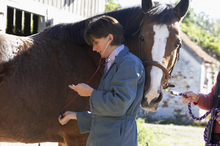As of 8/5/2015, the Colorado Department of Agricultureâs State Veterinarianâs Office has 53 locations in eight counties under quarantine for vesicular stomatitis (VS).

Veterinarians kept busy with new horse disease cases
Washington state and Colorado continue to confirm new cases of West Nile virus and vesicular stomatitis in horses in a number of counties with a number of horses now under quarantine.
Counties with Current VS Quarantines:
- Archuleta County 5 premises,
- Chaffee County 1 premises,
- Delta County 10 premises,
- La Plata County 5 premises,
- Larimer County 11 premises,
- Las Animas County 0 premises (Quarantine released),
- Mesa County 3 premises,
- Montezuma County 4 premises,
- Montrose County 14 premises.
Vesicular stomatitis (VS) is a viral blister-forming disease affecting humans and livestock, including horses, cattle, sheep, goats, pigs, llamas, and alpacas. Vesicular stomatitis virus is the only one of the blister-forming viruses to affect horses, which differentiates it from other devastating diseases of livestock such as Foot and Mouth Disease (FMD).
The vesicles burst after a day or two leaving ulcerative sores. Horses with mouth lesions may avoid food and water and may drool copiously, in fact excess salivation is often one of the first signs noted. Horses with coronary band lesions may become lame, and weight loss is not uncommon.
The disease generally runs its course within two weeks. While it causes significant economic loss and pain/debilitation to the horse, VS is generally not fatal.
West Nile cases in Washington
The Washington State Department of Agriculture (WSDA) has confirmed five new cases of West Nile virus in horses, bringing to six the number of cases so far this year and now surpassing the total number in the state for all of 2014.
The first case of West Nile virus in a horse this year was reported July 21 and involved an unvaccinated Quarter horse gelding in Kennewick. The horseâs condition continues to improve.
Veterinarians reported four new cases since then, all confirmed as positive for West Nile virus by the Washington State Universityâs Animal Disease Diagnostic Laboratory in Pullman. They include:
- A two-year-old unvaccinated Andalusian stud colt from Harrah, Yakima County. The horseâs condition is improving.
- A four-year-old unvaccinated Andalusian stud in Kennewick, Benton County. It has been euthanized.
- A three-year-old unvaccinated Quarter horse gelding in Mesa, Franklin County. The horse died.
- A nine-year-old Appaloosa mare in Othello, Adams County. It is unclear if it was vaccinated, but appears to be recovering.
- A three-year old Azteca male in Mabton, Yakima county. The horse was not vaccinated and appears to be recovering.
West Nile virus is a mosquito-borne zoonotic disease that affects both horses and humans. In horses that do become clinically ill, the virus infects the central nervous system and causes symptoms of encephalitis.
The case fatality rate for horses exhibiting clinical signs of WNV infection is approximately 33%. Data have supported that 40% of horses that survive the acute illness caused by WNV still exhibit residual effects, such as gait and behavioral abnormalities, 6-months post-diagnosis.
